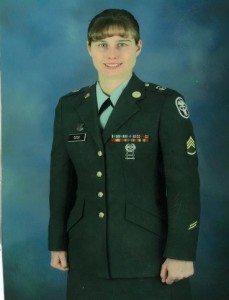*This article is part of In Public Safety’s September focus on career transitions*
By Michelle Beshears, professor of Criminal Justice at American Military University
Returning to civilian life after being in the military is not an easy transition. This is especially true for those who have spent a significant amount of time in the service and/or have been involved in combat situations.

During my time in the Army, I earned many medals, an associate’s degree, two bachelor degrees, achieved the rank of staff sergeant, and earned my commission as a second lieutenant. After spending 12 years in the Army and being a newly commissioned officer, I expected that I would retire after 20 years of service. However, those plans were altered when I was medically discharged at the age of 29.
Transitioning from the service to civilian life was a little scary at first, since being a soldier was all I had known in my adult life. During my time in the military, I developed a sense of camaraderie that those in other professions do not typically experience. That is, of course, with the exception of those in law enforcement, emergency medicine, and the fire service. Such professions lend themselves to extreme hardships, long hours, stress, sacrifice, and teamwork. These experiences build esprit de corps and a sense of belonging amongst members within the profession.
While I was young enough to begin a new career, I felt largely ill prepared for civilian life, so I turned to education. Fortunately, I had taken advantage of the educational opportunities afforded to me as a soldier and had earned my undergraduate degrees using the Army’s tuition assistance (TA) program. Immediately following my medical discharge, I used my G.I. Bill eligibility to complete two graduate degrees at Indiana State University.
In 2002, I was fortunate enough to come across American Military University (AMU), which was looking for instructors for the criminal justice program. AMU offered affordable online degrees to both civilian and military students. What attracted me most to the university was the service to non-traditional students who were juggling a career, family, and education, just as I had done during my time in the service. I knew I could relate to these students.
I jumped on board and have been instructing at AMU for 13 years. I am fortunate to have the opportunity to start a new career with colleagues and students with which I have built a similar sense of camaraderie that I experienced in the military.
That sense of teamwork fills me with a great sense of pride in my students. Many of my students have gone on to become commissioned officers in the military, gone to law school or graduate school, and have earned or are in the process of earning their Ph.Ds. Others have become FBI agents, Secret Service officers, or other high-ranking officials in law enforcement.
I have made numerous connections with students over the years and am always excited to hear about their accomplishments. To play even a small part in helping someone achieve educational and life goals is extremely rewarding and contributes to my own sense of success and accomplishment.
About the Author: Michelle L. Beshears earned her baccalaureate degrees in social psychology and criminal justice and graduate degrees in human resource development and criminology from Indiana State University. She most recently completed her Ph.D. in Business Administration with a specialization in Criminal Justice. Michelle served in the U.S. Army for 11 years. She obtained the rank of Staff Sergeant prior to attending Officer Candidate School at Fort Benning, Georgia where she earned her commission. As a commissioned officer she led numerous criminal investigations and worked with several external agencies as well. As a civilian, she has worked with the local sheriff’s department, state drug task force and FBI. Michelle is currently an assistant professor of criminal justice at American Military University & American Public University and is full-time faculty in the School of Security and Global Studies. You can contact her at michelle.beshears(at)mycampus.apus.edu.